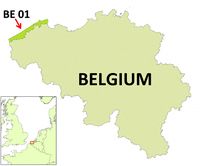Difference between revisions of "Template:This weeks featured article"
| Line 1: | Line 1: | ||
'''Fisheries in Blankenberge''' | '''Fisheries in Blankenberge''' | ||
| − | [[File:FLAG.jpg|200px|right]] | + | <div style="float:right; margin-left:10px">[[File:FLAG.jpg|200px|right]]</div> |
Belgium has a minor role in the European fisheries context with 0.35% of the total EU production of fish. In 2012, the Belgian commercial sea fishing fleet counted 86 ships, with a total engine capacity of 49,135 kW and gross tonnage of 15,326 GT. 45 vessels are part of the Small Fleet Segment (max 221 kW engine power) of which 2 use passive gear. The remaining 41 vessels belong to the Large Fleet Segment and have an engine power between 221 kW and a maximum of 1,200 kW. This fleet segment represents approximately 80% of the engine power capacity and 77% of the GT of the fleet. While a smaller number use trammel nets (passive gear) and otter trawl, the largest share of the Large Fleet Segment are beam trawl vessels (≥662 kW). The Belgian fleet is highly specialized: more than 68% of the effort(days at sea) and 77% of total landings are achieved by beam trawlers (2010) focusing primarily on flatfish species such as plaice (''Pleuronectes platessa'') and sole (''Solea solea''). The results of the reconstruction of the Belgian fleet dynamics since 1830 are presented in Lescrauwaet et al. 2013. | Belgium has a minor role in the European fisheries context with 0.35% of the total EU production of fish. In 2012, the Belgian commercial sea fishing fleet counted 86 ships, with a total engine capacity of 49,135 kW and gross tonnage of 15,326 GT. 45 vessels are part of the Small Fleet Segment (max 221 kW engine power) of which 2 use passive gear. The remaining 41 vessels belong to the Large Fleet Segment and have an engine power between 221 kW and a maximum of 1,200 kW. This fleet segment represents approximately 80% of the engine power capacity and 77% of the GT of the fleet. While a smaller number use trammel nets (passive gear) and otter trawl, the largest share of the Large Fleet Segment are beam trawl vessels (≥662 kW). The Belgian fleet is highly specialized: more than 68% of the effort(days at sea) and 77% of total landings are achieved by beam trawlers (2010) focusing primarily on flatfish species such as plaice (''Pleuronectes platessa'') and sole (''Solea solea''). The results of the reconstruction of the Belgian fleet dynamics since 1830 are presented in Lescrauwaet et al. 2013. | ||
Revision as of 11:34, 8 October 2014
Fisheries in Blankenberge
Belgium has a minor role in the European fisheries context with 0.35% of the total EU production of fish. In 2012, the Belgian commercial sea fishing fleet counted 86 ships, with a total engine capacity of 49,135 kW and gross tonnage of 15,326 GT. 45 vessels are part of the Small Fleet Segment (max 221 kW engine power) of which 2 use passive gear. The remaining 41 vessels belong to the Large Fleet Segment and have an engine power between 221 kW and a maximum of 1,200 kW. This fleet segment represents approximately 80% of the engine power capacity and 77% of the GT of the fleet. While a smaller number use trammel nets (passive gear) and otter trawl, the largest share of the Large Fleet Segment are beam trawl vessels (≥662 kW). The Belgian fleet is highly specialized: more than 68% of the effort(days at sea) and 77% of total landings are achieved by beam trawlers (2010) focusing primarily on flatfish species such as plaice (Pleuronectes platessa) and sole (Solea solea). The results of the reconstruction of the Belgian fleet dynamics since 1830 are presented in Lescrauwaet et al. 2013.
